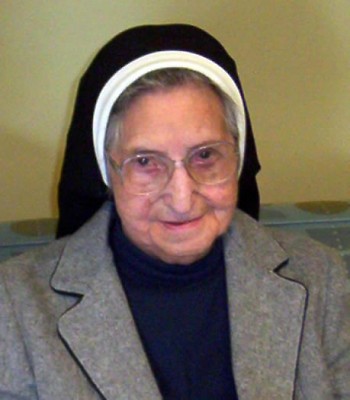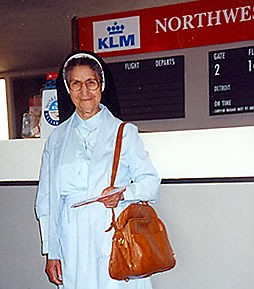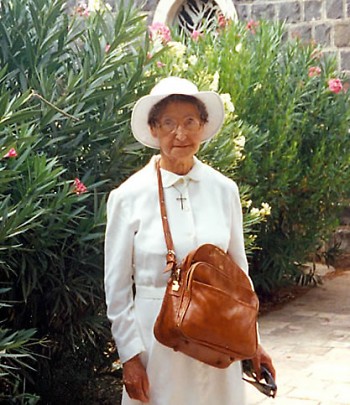I first see Sister Ann Perpetua sitting quietly on the couch, two books of prayer cradled in her lap, a few rays of sun dancing on the rosary that is wrapped around her fingers. Dressed in a light gray and dusty blue plaid skirt with a deep blue sweater and a gray blazer, her salt-and-pepper hair peaks out from around the edges of her veil—a modified version of the Dominican head gear that was part of the standard habit worn when she first arrived at Marywood in 1927. We are on the second floor of the Marywood Health Center.
I don’t think she expects me; when Sister Donna Jean (Common Life Coordinator at Marywood Health Center) tells Sister Ann Perpetua that she is the subject of my visit, she is gracious, a little embarrassed at the recognition, but completely cooperative. Sister Ann Perpetua Romero will become a member of the centenarian club on June 14th.
Onofre Romero (Sister Ann Perpetua) was born in 1910, the sixth of Teofila and Juan Romero’s ten children. The Romero family lived in the small mountain village of Penasco, New Mexico. According to Sister Ann Perpetua, the weather “wasn’t that much different than here in Michigan . . . there were very few houses and they were scattered sparsely here and there,” she adds as she waves her hands around indicating there was considerable distance between homes.
Her mother cooked all the meals from scratch on a wood stove in the family home and the Romero children were fed simple but good food. The spoken language at home was Spanish. Growing up in a large family had benefits. For the children, it meant that there was always someone with whom to play. For the parents, there were many helping hands when it was time for chores. In sharing the many tasks, the children learned to work together and develop a strong sense of service to others in times of need.
Onofre Romero arrived in Grand Rapids in 1927, becoming the first of many vocations for the Dominican community from the southwestern Dominican fields. She then faced what she remembers as one of her greatest challenges—learning to speak English by just “picking it up” without a class or lessons in the language—pure immersion and necessity. She met this challenge head on and quickly became fluent in English.
When Sister was on her first mission, she remembers that she cooked with gas – a vast improvement from her mother’s wood stove. There were still limited ingredients available and people cooked with “whatever was in season” depending less on imported foods and spices. No microwaves, processed foods or frozen dinners—no chemicals, additives, or preservatives. Cooking was, as it was for her mother, from scratch.
There were many Sisters in every convent, which required preparing large amounts of each dish. That, in turn, meant dealing with huge, heavy pots and pans filled with hot food; three times a day, every day. Homemaking and meal preparation was truly an aerobic activity. Sister Ann Perpetua worked in several missions in Michigan, New Mexico, and one in California. She does not play favorites, saying, “I loved all of them. I always enjoyed cooking.”
She took two major trips abroad: one to tour Portugal, Spain and France, and another in 1994 for a ten-day tour of the Holy Land. In 2008, she had the opportunity to go back to Arizona for a month to visit family and friends who still live in the southwest. Her time there was priceless, but she is very much at home here with her Sisters in community.
Sister Donna Jean shared in the memories during our conversation. She recalled attending a spectacular and delicious spread prepared by Sister Ann Perpetua consisting exclusively of southwestern Spanish food. Sister Ann Perpetua, a true culinary artist, admits with a smile that her chili is not for the slight of palate. She says, “It’s hot.”
When I asked about those mounds of sour cream, guacamole, and cheese we are so accustomed to piling on our food, she waved her hands in the air and laughed heartily, saying, “Oh no, not of that stuff!”
Small of stature and thrifty with words throughout life, this gentle woman has directed her energy toward the ministry of homemaking—giving nourishment to others. With the interview over, a few snapshots taken, I felt like I’d known her all my life and I didn’t want to leave. I felt completely at home in her presence—that’s what homemakers do. Sister Ann Perpetua is a master artist at homemaking. I finally asked the required question to which we all hope to find an easy and quick answer: “To what do you attribute your long life?”
Her mother lived to be ninety-nine; and, yes there is a strong argument for genetics, but she has her own ideas about longevity. With a sparkle in her eyes, and a mischievous smile, this wise and delightful homemaker vehemently replied, “Behave Yourself!”
by: Rosemary Steers, Communications Specialist || Dominican Sisters ~ Grand Rapids
For regular updates and events, visit us on Facebook
The Rapidian, a program of the 501(c)3 nonprofit Community Media Center, relies on the community’s support to help cover the cost of training reporters and publishing content.
We need your help.
If each of our readers and content creators who values this community platform help support its creation and maintenance, The Rapidian can continue to educate and facilitate a conversation around issues for years to come.
Please support The Rapidian and make a contribution today.
Comments, like all content, are held to The Rapidian standards of civility and open identity as outlined in our Terms of Use and Values Statement. We reserve the right to remove any content that does not hold to these standards.



